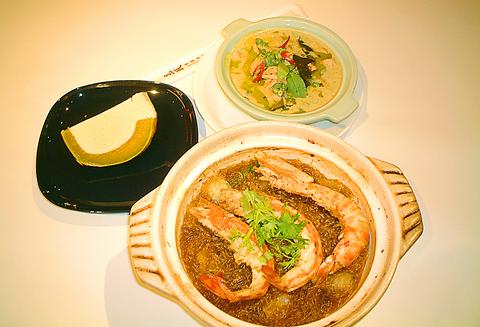One of Taipei's long-serving Thai restaurant chains, Thai Town Cuisine -- which until earlier this year went by the name Very Thai -- has been cooking up some of the tastiest and spiciest Siamese meals in the city for over six years.
Unlike the bad luck that is likely to ensure following the changing of a ship's name, the name-change and interior face-lift that saw the chain's Nanjing East Road store reopening under its new moniker earlier this year, have neither dented its reputation nor seen the restaurant flounder in anyway.

PHOTO: GAVIN PHIPPS, TAIPEI TIMES
In fact, since reopening for business in April, Thai Town Cuisine, with its new slick black-and-red interior, has experienced quite the opposite after-effect. Patronage has continued to increase and looks set to continue to do so for the unforeseeable future.
The secret of its success, according to marketing supervisor Jean Lin (林宜靜), lays not only with the quality of the food served at Thai Town Cuisine, but is also heavily influenced by management's tenacity for consistency. Whether you choose to chow down at the chain's Tienmou branch or its Yongho branch, the food that will arrive at your table will be equally scrumptious, regardless of the social environment of the neighborhood you opt to dine in. "It's often difficult when you run a chain store to maintain a constant level of quality," explained Lin. "With one restaurant, it's easy to keep a good reputation, but, more often than not, when restaurants expand it all goes downhill." To ensure Thai Town Cuisine doesn't join the long list of establishments that have branched out, but failed to keep them coming back for more, management keeps an eye on its kitchens and what takes place within them. Much of what appears on the menu certainly won't come as a surprise to lovers of traditional Siamese fare. The uniform quality of the product, however, is worth noting. The menu is packed with all the standard Thai dishes such as curry crab (NT$450), sweet and sour cod Thai-style (NT$300), king pawn vermicelli (NT$450), spicy beef and cashew nuts (NT280) and coconut beef curry (NT$280) to name but a few. Along with the usual suspects, Thai Town does throw a few original dishes in the diner's direction. Finding dishes such as the red curry with vegetables and fruit (NT$180), deep-fried sea bass with tamarind and chili (NT$450), spicy octopus with cashew nuts (NT$300) and roasted pork with lemon sauce (NT$280) on the menu makes for a pleasant and certainly tasty change. The thing that really sets Thai Town Cuisine apart from its many peers, however, is the manner in which the chefs ensure each dish fires a chili-loaded salvo. Whatever you choose to dine on, it's guaranteed that it will contain a whole heap of chili and garlic. As well as Thai Town Cuisine's Yongho, Nanjing East Road and Tienmou branches, fans of Thai food who call Panchiao and Sanchung home can also experience the chain's appetizing Thai food.

The unexpected collapse of the recall campaigns is being viewed through many lenses, most of them skewed and self-absorbed. The international media unsurprisingly focuses on what they perceive as the message that Taiwanese voters were sending in the failure of the mass recall, especially to China, the US and to friendly Western nations. This made some sense prior to early last month. One of the main arguments used by recall campaigners for recalling Chinese Nationalist Party (KMT) lawmakers was that they were too pro-China, and by extension not to be trusted with defending the nation. Also by extension, that argument could be

Aug. 4 to Aug. 10 When Coca-Cola finally pushed its way into Taiwan’s market in 1968, it allegedly vowed to wipe out its major domestic rival Hey Song within five years. But Hey Song, which began as a manual operation in a family cow shed in 1925, had proven its resilience, surviving numerous setbacks — including the loss of autonomy and nearly all its assets due to the Japanese colonial government’s wartime economic policy. By the 1960s, Hey Song had risen to the top of Taiwan’s beverage industry. This success was driven not only by president Chang Wen-chi’s

Last week, on the heels of the recall election that turned out so badly for Taiwan, came the news that US President Donald Trump had blocked the transit of President William Lai (賴清德) through the US on his way to Latin America. A few days later the international media reported that in June a scheduled visit by Minister of National Defense Wellington Koo (顧立雄) for high level meetings was canceled by the US after China’s President Xi Jinping (習近平) asked Trump to curb US engagement with Taiwan during a June phone call. The cancellation of Lai’s transit was a gaudy

The centuries-old fiery Chinese spirit baijiu (白酒), long associated with business dinners, is being reshaped to appeal to younger generations as its makers adapt to changing times. Mostly distilled from sorghum, the clear but pungent liquor contains as much as 60 percent alcohol. It’s the usual choice for toasts of gan bei (乾杯), the Chinese expression for bottoms up, and raucous drinking games. “If you like to drink spirits and you’ve never had baijiu, it’s kind of like eating noodles but you’ve never had spaghetti,” said Jim Boyce, a Canadian writer and wine expert who founded World Baijiu Day a decade